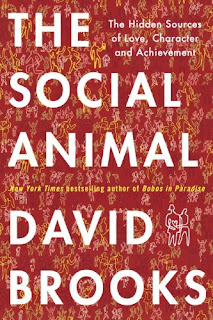After reading my slam on David Brooks’s The Social Animal, Dylan had some objections:
“Other than the fact that it’s terribly, terribly written and completely expository (it makes the Emile, on which it is clearly modeled, look like an actual novel by comparison), what’s so “yikes” about the exact passage you excerpted? Can you really be such a HP&TMoR fan/transhumanist and also think that treating so-called “cognitive biases” as limitations to be overcome is tantamount to “unweaving the rainbow”? I agree that David Brooks’s (I know you’ll be crotchety about that, too, but it’s actually the older convention for non-plural possessives when the word ends with an S) broader conception of happiness and fulfillment seems pretty bankrupt, but I don’t see how this passage illustrates that.”
I want to start by clearing up one serious misconception: I do not object to the possessive of Brooks being Brooks’s, in fact, I vastly prefer it to Brooks’. Now on to the content.
One of my objections to Brooks is that ‘unweaving the rainbow’ is only ok if you know what you’re doing. Brooks tends to overstate the science he cites. The review today at The New York Times disapprovingly references this tendency as follows:
“Brooks seems willing to take seriously any claim by a cognitive scientist, however idiotic: for example, that since people need only 4,000 words for 98 percent of conversations, the reason they have vocabularies of 60,000 words is to impress and sort out potential mates.”
Brooks’s is willing to simplify complex phenomena past what the data and theories will bear. In my head, I was using the phrase ‘unweaving the rainbow’ to mean discarding what you can’t explain, refusing to acknowledge the whole for fear of revealing the weaknesses of the model. Now that I’ve gone to look at the origin of the phrase (an accusation by John Keats against Isaac Newton), I can see it’s not a good fit for my critique. Keats meant to indict Newton and other scientists for spoiling things with any attempt at explanation. A poor choice of phrase on my part.
My larger objection to Brooks, and the reason I would not put him in the HP&TMoR fan/transhumanist camp, is that he presents a great deal of data and doesn’t want to do much of anything with it. He goes over priming and other discoveries of evolutionary psychology to make it clear our rational minds have less control over us than we think. But, as far as I can tell, he doesn’t outline any measures we can take to wrest this power back.
This is a major contrast with the folks at Less Wrong, who turn explanation into tools for engineering. Brooks seems satisfied with describing some factors underlying the status quo. It’s interesting to know that holding a warm drink may spur me to have warmer feelings; it’s useful for me to grab a hot chocolate before I go to meet someone I know I habitually treat uncharitably.
As far as I can tell from reviews, Brooks’s characters narrate their psychology to themselves but never try to shape it. (I’m not planning to buy the book, given the reviews, but I’ll browse through it in the bookstore when I get back to campus and let you know if I’m wrong about this). The NYT hypothesized that Brooks’s avatars never act because they have no telos:
“Life, morality and politics are not science, but their improvement requires thought — not only thought about the most effective means of shaping people, which is Brooks’s concern, but thought about what our ends should be. Such questions don’t appeal to him, since they cannot be settled by empirical evidence of the kind he feels comfortable with.”
I don’t know if the reviewer’s complaint is accurate about Brooks’s beliefs, but the fact that this book keeps prompting this reaction strengthens my discomfort. Whether Brooks meant to or not, he seems to have written a sterile, simplistic book on human behavior that continues to turn people off. Fostering that distaste is a disservice to science, to transhumanism, and to the pursuit of human virtue.
P.S. Interested in thinking some more about problems of being human? Christian from The Thinking Grounds just posted part 2 of his series on the boundaries of Self and Body.

















